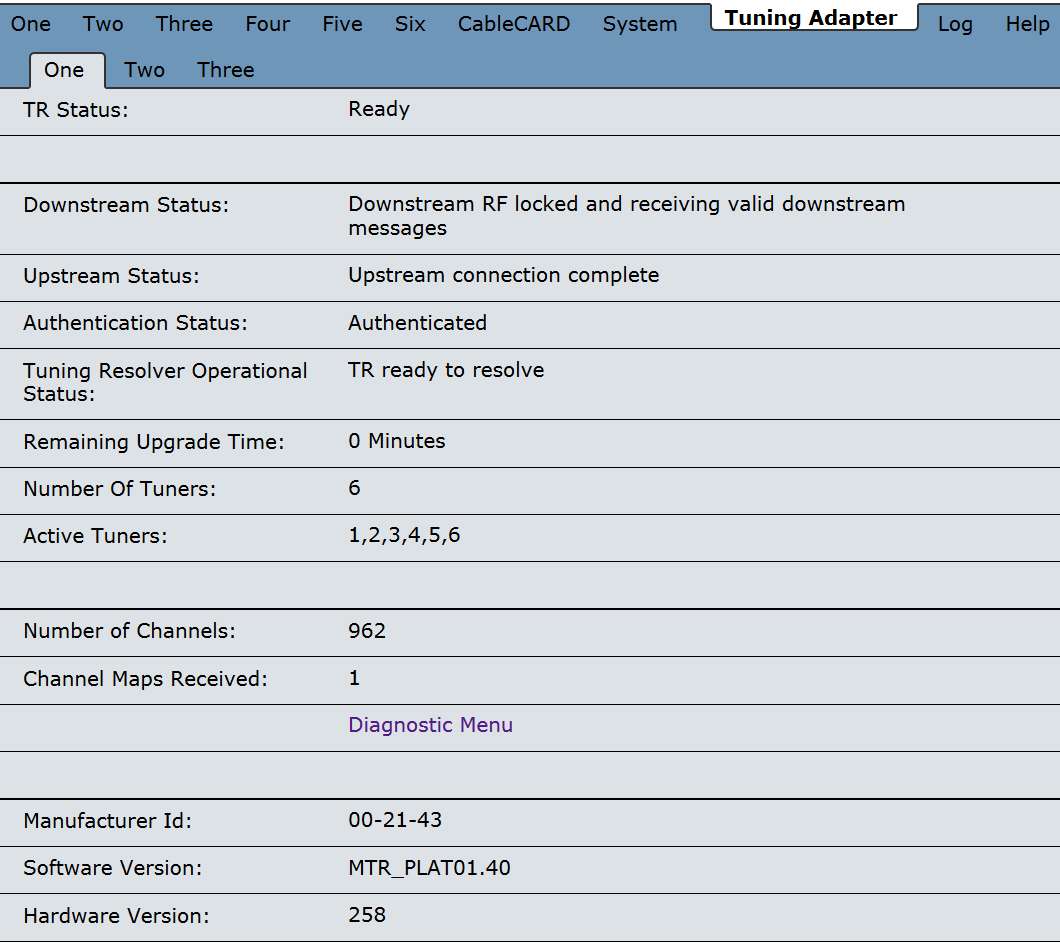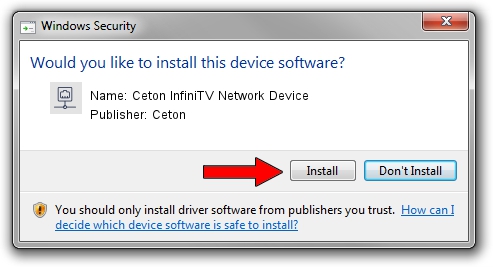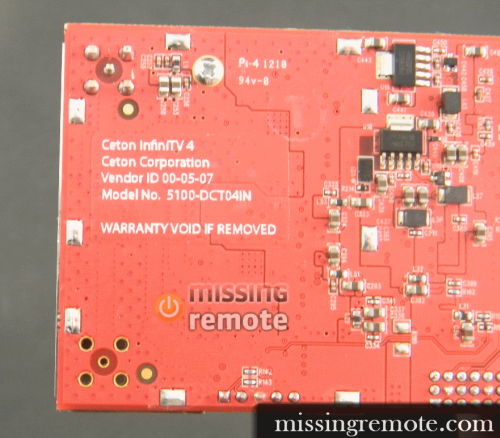
- USB-to-CAN VCI4-Driver 4.0.709.0 (Windows® 10 / 8.1 / 8 / 7 - 32/64 bit) SysTec USB-CANmodul Driver 6.04r1 (Windows® 10 / 8.1 / 8 / 7 - 32/64 bit) LED Array USB Treiber; Firewire 1394 Kameratreiber (CMU1394).
- USB-to-CAN VCI4-Driver 4.0.709.0 (Windows® 10 / 8.1 / 8 / 7 - 32/64 bit) SysTec USB-CANmodul Driver 6.04r1 (Windows® 10 / 8.1 / 8 / 7 - 32/64 bit) LED Array USB Treiber; Firewire 1394 Kameratreiber (CMU1394).
Download Ceton TV-tuner drivers or install DriverPack Solution software for driver scan and update. Ceton InfiniTV is a free program that will install current Windows drivers for all InfiniTV devices, as well as Switched Digital Video Host application and Tuning Adapter drivers. It also includes a Ceton InfiniTV Diagnostic Tool that provides the status of your InfiniTV device, lets you update to the latest firmware and helps you activate your. Ceton: This manufacturer has never supported the BDA standard in Windows, consequently anyone who wished to support them must integrate their proprietary framework. In addition, the company has discontinued development and support of the drivers and as such, Plex cannot support these.
OpenLDV 5 Network Driver for Windows
Network Interfaces
Software

The OpenLDV 5 Network Driver for Windows provides IzoT and LonWorks tools and applications with an open and unified Windows software interface for sending and receiving messages through LonTalk/IP and LON network interfaces. The OpenLDV 5 driver supports network interfaces from Echelon, and also supports compatible network interfaces available from other manufacturers.
OpenLDV 5 includes integrated drivers for the following Echelon network interfaces:
Ceton Tuner Drivers
- IzoT Router with Remote Network Interface (RNI)
- SmartServer and i.LON 100 Controllers with RNI
- U10, U20, and U60 USB Network Interfaces
- i.LON 600 LonWorks/IP-852 Router with RNI
- PCC-10 PC Card Network Interface
- PCLTA-20 and PCLTA-21 PCI Network Interfaces
- SLTA-10 Serial LonTalk Adapter (requires separate driver)
The OpenLDV 5 driver interface also works with Echelon's legacy network interfaces such as the PCLTA, PCLTA-10 and SLTA/2.
The OpenLDV 5 driver (requires .NET Framework 3.5) is supported on the following versions of Microsoft Windows: Windows 10 (64-bit and 32-bit), Windows 8.1 (64-bit and 32-bit), Windows 8 (64-bit and 32-bit), Windows 7 (64-bit and 32-bit), Windows Server 2012 R2 (64-bit), Windows Server 2008 R2 (64-bit), Windows Server 2008 (32-bit), Windows XP (32-bit), or Windows Server 2003 (32-bit).
For Windows 8, 8.1 and 10 you need to manually install .NET Framework 3.5 through the Windows Control Panel Program and Features “Turn windows features on or off”. For older Windows Operating Systems like XP, .NET Framework 3.5 is installed automatically by the OpenLDV 5.0 installer if needed.
IMPORTANT: Drivers for Centon USB storage devices are already built-in to the following operating systems:
- Windows ME
- Windows 2000
- Windows XP
- Windows Vista
- Windows 7
- Windows 8/8.1
- Windows 10
- Mac OS 9
- Mac OS X
- Linux kernel 2.4 and newer
Driver download is only necessary for Windows 98. [Update: Support for Windows 98 has ceased.] No driver is available for DOS, Windows 95 or other operating system not listed here.
If your USB Flash drive is not working as expected, this guide will help you to determine what the nature of the problem might be and how to remedy the unwanted behavior.
Update Operating System: The first thing to do is make sure that you've got the latest software updates installed on your computer. Sometimes a device may have trouble if the software doesn't have the latest components to handle it. Refer to your operating systems website to obtain the latest software updates and service packs.
Download the latest drivers: If you've updated your operating system software but the issue still persists, check for system chipset/USB drivers available from your computer manufacturer's support website. While there, confirm whether there is a newer revision BIOS available for your system. A newer revision BIOS may address certain USB related issues.
Troubleshoot the device: If you've updated your software and checked the drivers but the issue still persists, try the following things:
- Unplug the USB device and then plug it back in. Make sure that the connection is snug and installed in the proper direction. Note that USB plugs fit one way only. If you try to plug them in upside-down, it will not insert.
If this does not solve your issue:
- Unplug all USB devices from the computer. Then start plugging in USB devices one at a time, testing each one to make sure they all work before adding the next. Sometimes two devices will conflict and will work together.
If this does not solve your issue:
- Is this a new device that never worked, or is it a device that you've had for a while that suddenly stopped working? If it used to work, think about what changed just before the device stopped working. Did you recently add another new device? Install a new program? Try reverting the computer to the way it was before the device stopped working. If it works again, there is an incompatibility with the device and whatever you added.
Cached
If this does not solve your issue:
- Unplug all but suspected USB devices. Open System Devices menu:
- Windows: Right click “My Computer” > Properties > Hardware > Device Manager > USB Serial Bus Controllers
- Mac: Applications > Utilities > System Profiler
- Linux: Due to the differences in Linux flavors, you should refer to your Linux guide to find this control panel.
- Under the USB information, you should see the USB devices connected to your system. (Disregard any Host controllers) The name may not be identical to your device (it may say “USB Mass storage device”), but it should have the right number of devices listed.
If this does not solve your issue:
- If you have the device plugged into a USB hub or into your keyboard, plug it directly into one of the USB ports on the computer. If it works there, the issue is with the device to which it had been previously connected. The device may need more power than the port provides.
If this does not solve your issue:

- Does the affected device have a power cord? If it does, try unplugging and re-plugging it. Make sure it's plugged into a working power outlet (you can test the outlet by plugging in a lamp or clock)
Ceton Drivers
One additional resource for troubleshooting....
Microsoft Support - Article ID: 925196
A computer that is running Windows XP cannot detect a USB flash drive....
support.microsoft.com/kb/925196
You attach a USB-based device to a computer that is running Windows XP. Then, you try to scan for hardware devices. However, the computer does not detect the attached device, and you do not see the device in the My Computer folder.
This problem can occur if there are corrupted or incorrect keys in the registry. This article helps you fix the problem.
Please visit support.microsoft.com/kb/925196 for more information.

Comments are closed.